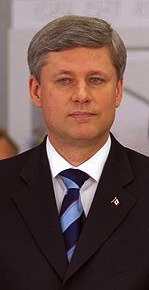In the Kabuki theatre that is a Canadian federal election during the post-modern era, the Conservative Party appears set to play its traditional role as the Party of Fear.
The policy positions staked out in the past few days and weeks by the Conservative government of Prime Minister Stephen Harper pretty clearly indicate that “scare the beejeepers out of the audience” is the government’s stage direction to the Conservative actors about to play their roles the next federal election.
It seems more or less likely too that the Liberals, New Democrats and Bloc will also play traditional roles — those of the party of cautious hope (we have a somewhat similar, but slightly better, plan), the party of conscience (do the right Canadian thing) and the defender of Quebec’s cultural interests (je me souviens).
But in virtually every way, the definitive sounding positions put forward by the prime minister in various venues, including what sounded suspiciously like a campaign kick-off interview with a tame Postmedia News interviewer on Wednesday, are profoundly negative, designed to play to the darkest fears of Canadians.
The Big Three:
– Beware an evil coalition that would consort with separatists
– Make sweet with Uncle Sam or pay the price
– Build more prisons, jail more prisoners, or see our streets aflame
Each of these positions is designed to appeal to the deepest fears of specific groups of Canadians. Even if they are profoundly destructive of our national future — as the demonization of the Bloc is bound to be — nothing will turn Harper from what he presumably sees as his only hope to form a majority.
The Conservatives and the other parties even approach the same groups of Canadians in different ways. The Liberals in particular may try to appeal to women as, to paraphrase U.S. President Abraham Lincoln‘s First Inaugural Address, the better angels of our Canadian nature, a strategy summarized by the Globe and Mail as “the Tories do not understand what families are going through.”
The Conservatives, judging that women are more likely to fear for their physical safety than men, truly see their dark emphasis on crime and punishment as a kind of “women’s issue” too. Never mind, of course, that jailing more and more of our fellow Canadians will not make us safer, as the experience of our troubled neighbour to the south so clearly illustrates.
Now, the proposal that got most of the news coverage — the scheme to end the “subsidies” to political parties by destroying Jean Chrétien‘s historic compromise on the financing of democracy is not so much a policy as a trigger the prime minister can pull to force the opposition parties to bring down his government at a moment of maximum convenience to the Conservatives.
As the leader of the party of Big Business and the concentration of capital, Harper understands that any democratic mechanism that makes an election a contest of ideas instead of a contest of money is to his party’s disadvantage. He knows, in other words, that if elections can be bought (as they surely can, especially in a semi-democracy with a politically monochromatic media and a single-member plurality electoral system), they are most likely to be bought for a party like his.
As such, especially at this polarized and Americanized moment of Canadian history, wide-open financing based only on who has the big bucks poses an existential threat to all the Opposition parties. This provides the prime minister with his magic Parliamentary bullet to fire by bringing forward campaign financing “reform” legislation and then blaming the Opposition for the resulting election.
Whether the latest EKOS poll results indicate that Canadians are buying Mr. Harper’s studied negativity, or merely that they haven’t cottoned on to the distant and professorial Ignatieff, is unclear. But the results clearly suggest that Ignatieff will quickly feel the need to drop his talk of forcing an election any time soon, at least if he has his vaunted wits about him.
Speaking of lines from First Inaugural Addresses, as we were, Franklin D. Roosevelt famously advised Depression-bound Americans in his that “the only thing we have to fear is fear itself — nameless, unreasoning, unjustified terror which paralyzes needed efforts to convert retreat into advance.”
In 2011, or whenever the next federal election comes, Harper’s strategy is to appeal to our nameless, unreasoning, unjustified fears.
This post also appears on David Climenhaga’s blog, Alberta Diary.



